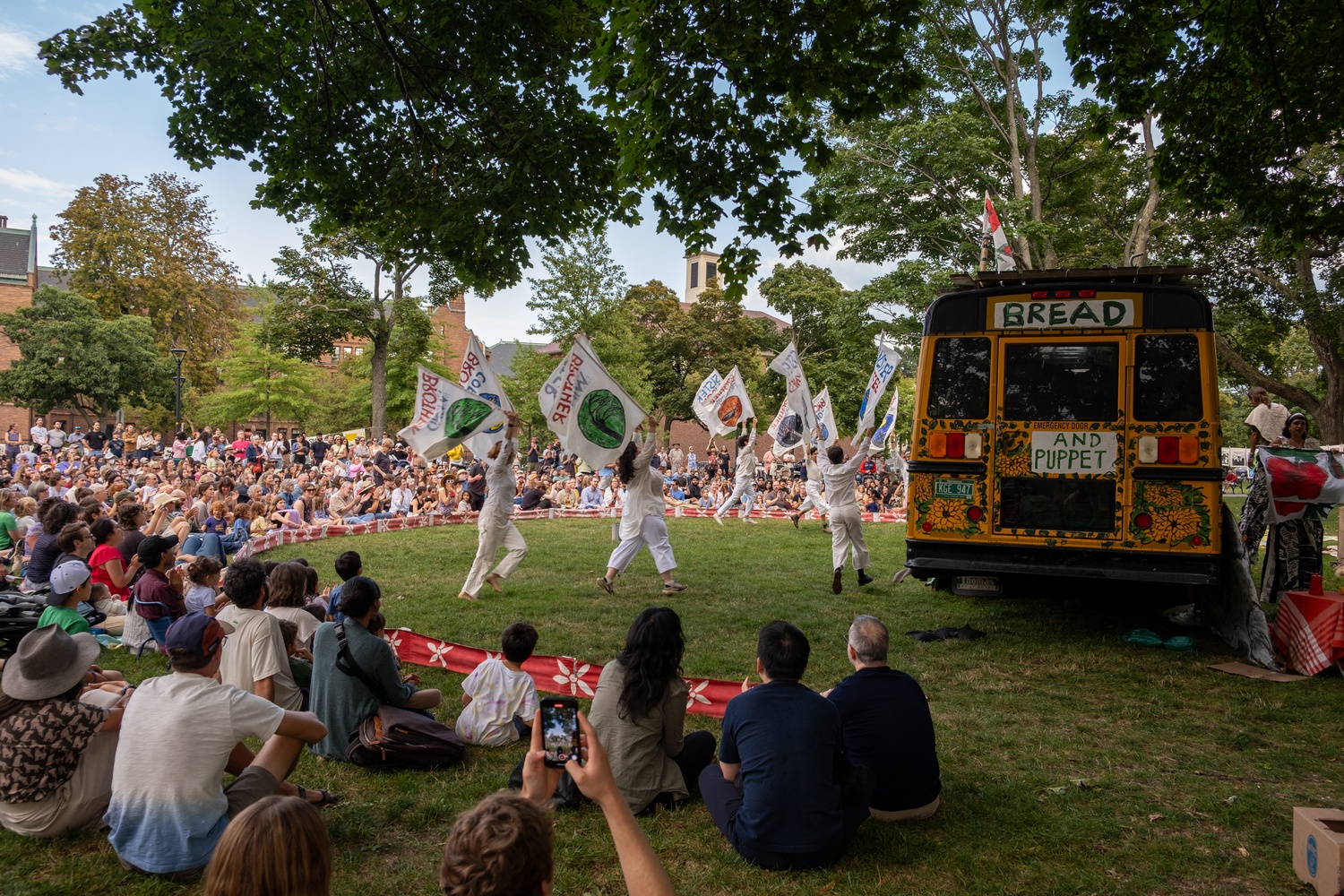
The Bread and Puppet Circus: Resurrecting Revolution in Cambridge Common
Under the eyes of a papier-mâché puppet representing God, a group of white-clothed performers sang protest songs to the tunes of a live brass band. Woodblock prints hung on lines strung between the surrounding trees. One promoted climate justice by depicting a plant with an elaborate root system against a vivid lavender background, below the word “Retaliation.” Nearby, a school bus with poppies painted on its side sat in a grass clearing.
Last Saturday, residents of the greater Boston area gathered in Cambridge Common for the Bread and Puppet Circus. The radical performance theatre troupe, which originated in New York City in 1963, promotes political messages and raises awareness about current issues through circus art and puppetry. They are currently on their annual cross-country tour — “Our Domestic Resurrection Revolution in Progress.”
During the next two hours, audience members enjoyed performances ranging from a six-foot-tall puppet of Mother Earth trailing colorful paper streamers to a caricature mask of President Donald J. Trump sporting a large yellow crown.
“We are joined by Palestinian peace cranes on their way to Washington,” the theatre said in a statement to Cambridge Arts. “Green frogs who teach the art of hopping over seemingly insurmountable problems, and gaggles of kindergarten butterflies who frolic to their hearts’ desire. Join us for a serious and silly circus.”
Paul H. Bedard, tour booker and performer for Bread and Puppet, says the show balances the silly and serious.
“If you focus too much on the silly, you’ll miss the serious things that are happening all around you. If you focus too much on the serious, you’ll burn out,” Bedard says. “I think making the revolution joyous and funny is as important as naming the atrocity.”
Lounging on lawn chairs and spread out on blankets, the audience roared with laughter at a skit portraying a Walmart workers’ union winning their right to sit during shifts by knocking over a giant puppet of a boss man in a suit. Moments later, the same audience sat together in thoughtful silence at a speech lamenting lost lives in Palestine. A live band performed background music that included protest songs from around the world.
“It was very touching,” says audience member Camila Matta, “I’m from Latin America, from Chile specifically, and they were singing Chilean songs of resistance from during the dictatorship.”
“For me, it was a kind of a catharsis,” Matta expresses. “I am working with migrants on a daily basis, and at the same time thinking about those who are losing their lives overseas, and feeling impotent.”
Bread and Puppet began in New York’s Lower East Side in 1963, raising awareness about local progressive issues like rats and tenements. The troupe grew in popularity during the anti-Vietnam War movement, crafting giant handmade puppets that walked alongside Vietnam War protestors on the streets. The troupe moved from New York City to Vermont in the 1970s, where it currently resides.
Many crowd members had seen Bread and Puppet on tour before, but for some college students and passersby, it was their first time witnessing this production.
“I had really no idea what to expect, other than bread and puppets,” says audience member Julia N. Wilkinson, an undergraduate student at Tufts University. “I was just told, ‘you sit and you watch.’ And it was fantastic, so I highly recommend.”
The name “Bread and Puppet” comes from the troupe’s tradition of serving fresh bread with their signature aioli after every performance. The food is free, offering people the chance to share a meal and foster community. The practice is also symbolic, mirroring the theatre’s central principle that art is as necessary as bread to life and living.
“We believe that art belongs in kitchens and on streets, not just sequestered behind pay walls at museums,” Bedard explains.
While the performance often included heavy topics, the circus format made it accessible to a wide range of audiences. Young children ran around as performers sang onstage about what to do if an ICE agent knocks on your door. They held signs such as “Don’t sign anything” and “Ask for a lawyer” as actors dressed as butterflies flapped their wings on the stage.
“I think the silliness also makes it accessible to children and people of all ages,” says Bean A. Pecorari, a local artist. “Oftentimes, we get in a vacuum talking about complex issues with other adults, and children just simplify everything in such a way that makes everything more digestible.”
The more serious messages also struck a chord with many audience members, including local Peter A. Fray-Witzer.
“It’s very hopeful, involving the silly elements and things that are so dark and so hard to process in a space other than in a community that’s willing to imagine hopeful possibilities,” Fray-Witzer says.
As the performance came to an end, the audience split off into two groups. Some lined up to try the iconic Bread and Puppet bread with aioli while others flocked tables full of books, posters, postcards, pamphlets, and “Cheap Art” art for sale.
“We want to lift people’s spirits, so that people have the energy and hope to fight for the world that we all deserve,” Bedard says.
A few minutes earlier, actors dressed as grandmas chanting “up up with liberation, down down with occupation” had just performed on stage to the audience’s cheers.
—Magazine writer Micaela Arenas can be reached at micaela.arenas@thecrimson.com.


